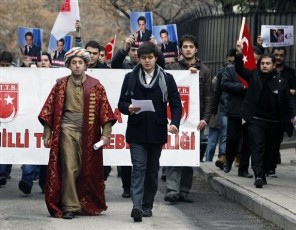Sudan slams France’s parliamentary vote on Armenian genocide bill
December 23, 2011 (KHARTOUM) – The Sudanese government denounced a French parliamentary bill criminalizing those who deny that the 1915 mass killing of Armenians by Ottoman Turks amounted to genocide.

Khartoum expressed solidarity with Ankara in its row with Paris.
“The [Sudanese] Ministry of Foreign Affairs would like to express its surprise and deep condemnation of this position by the French Parliament, which we do not find any explanation for except that it considers the right to differ in the understanding of history and expression of that understanding a crime punishable by law, and at the same time insists on the trial of history facts even on which there is no interpretation agreement,” the statement said.
“The insistence of the current French leadership on labeling the Turkish state with what it considers acts in violation of the law and linking it to the Islamic identity of the Turkish people is nothing but a clear attempt to label Islamic history as such and criminalizing the Islamic Caliphate era, in the context of the French position known to oppose Turkey joining the European Union in light of the identity of its Muslim population”.
“The Sudanese Foreign Ministry…..declares solidarity with the people and Government of Turkey, and calls upon all peace-loving nations of justice to stand against attempts to stir up hatred between nations and people on the basis of ethnic or religious identity”.
The Sudanese President Omar Hassan al-Bashir himself is wanted by the International Criminal Court (ICC) for war crimes and genocide in Darfur, the first sitting head of state the court has indicted.
The United Nations estimates some 300,000 people have died since mostly non-Arab rebels took up arms in Sudan’s west against Khartoum in early 2003. Washington is the only nation that has described the conflict there as genocide.
(ST)
